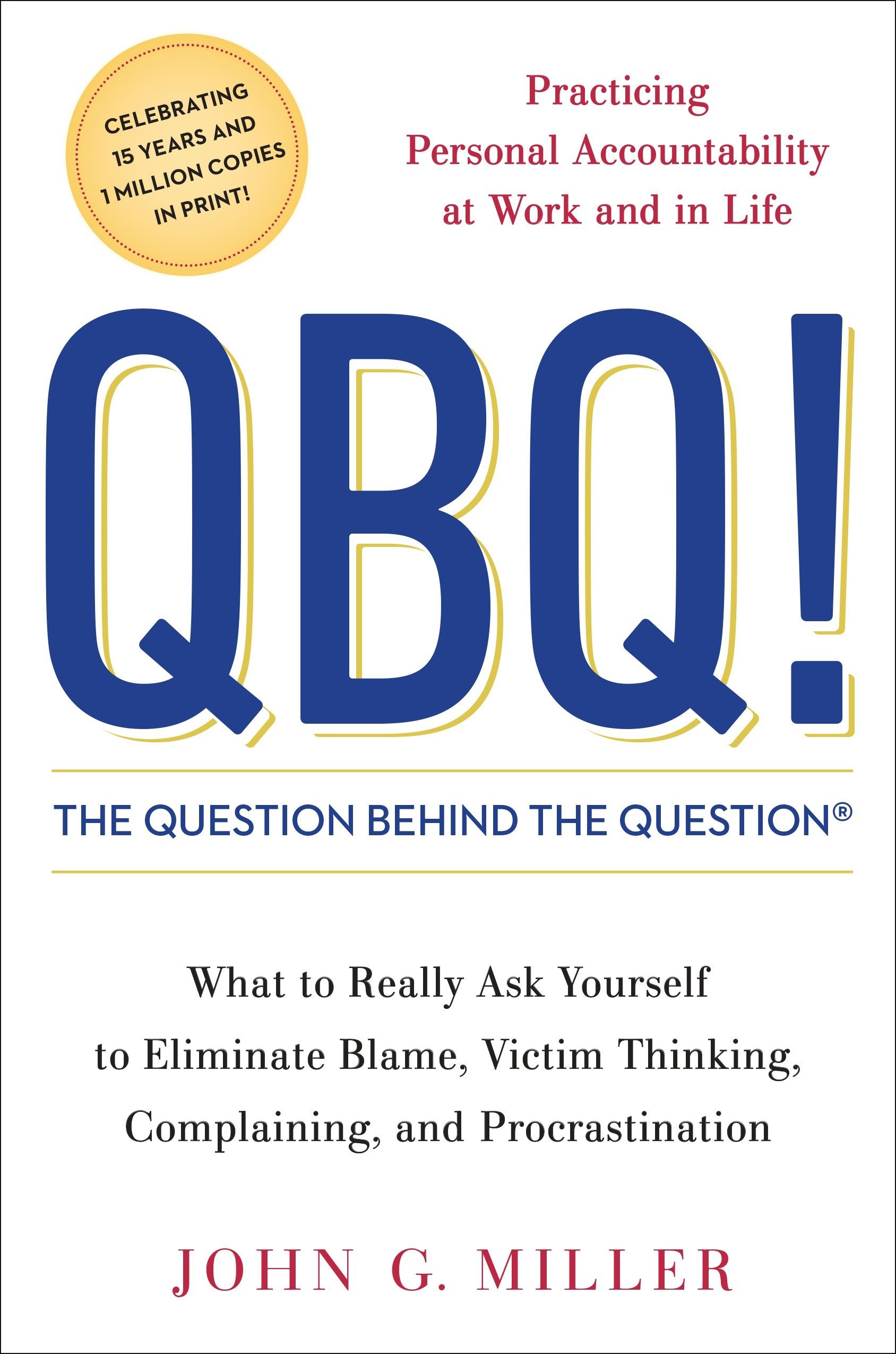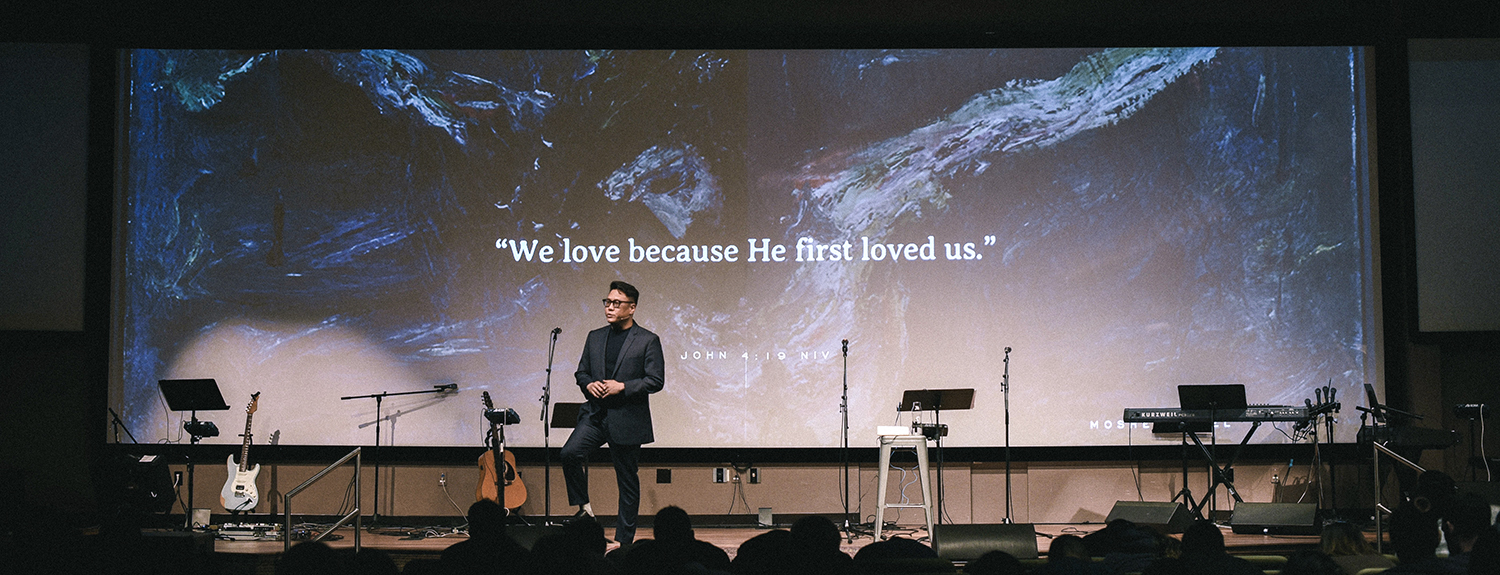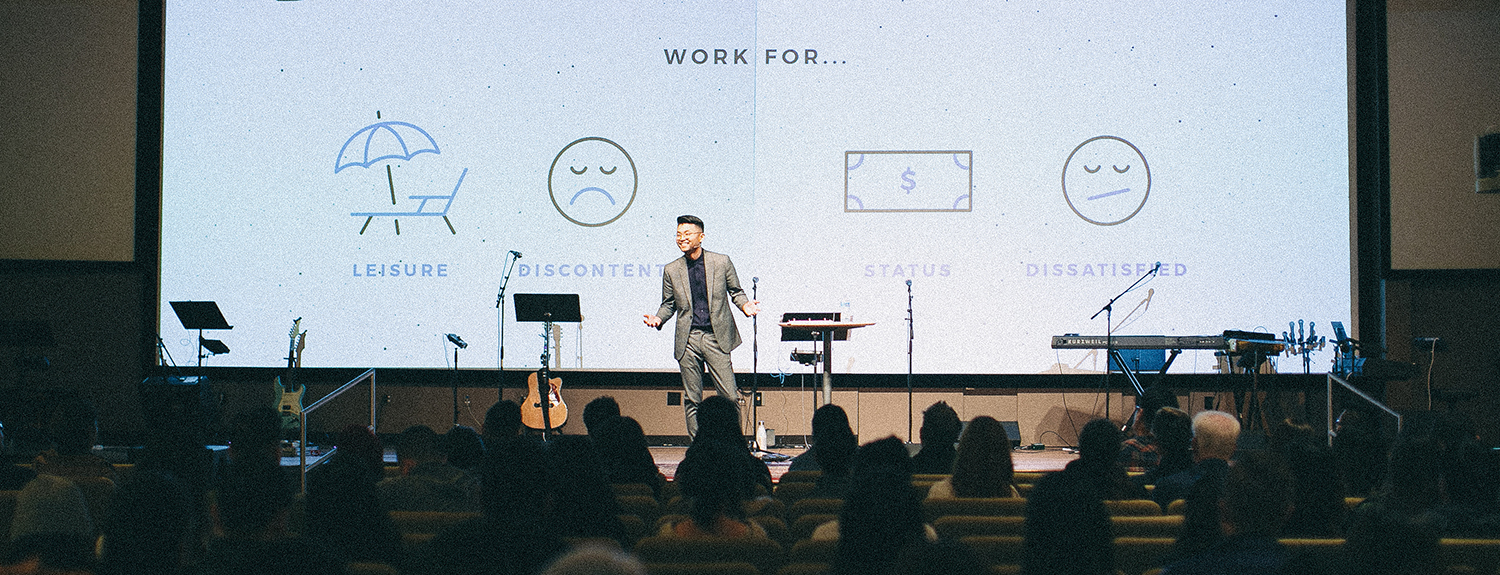The Life of Joseph (Tommy Casarez)
I Still Haven’t Found What I’m Looking For
What You’re Rooted and Planted In (Isaac Chong)
Leave and Cleave
Most people are often surprised at how hard marriage really is once they get married. Dissatisfaction or frustration arises as most people enter into covenant under-prepared and untrained.
This usually happens, because we have an unrealistic view of marriage.
Alain De Botton explains that as a society, “We are collectively a great deal more interested in a beautiful wedding than a tolerable marriage.”
We put so much effort and planning into an immaculate ceremony, but not nearly enough into the preparation of the actual marriage. So, we need to prepare ourselves properly for marriage, to possess a theological vision of it and to carefully pick a suitable partner for life.
How do we prepare for marriage? According to Ephesians 5:21-32, we have to be prepared to:
- Submit (listen, obey and learn) to our spouse
- Give ourselves up and make sacrifices
- Cheer, celebrate and coach our partner’s growth in godliness
- Help our mate accomplish their mission in Christ
- Love our spouse
like we love ourselves - Feed and care for our spouse
- Leave our families and cleave to our spouse
- Amplify the Good News through our union
- Respect our spouses and see Jesus in and through them
Essentially, when we get ready for marriage, we must be ready to bless and give our best all the time for the rest of our lives.

What if God designed marriage to make us holy more than to make us happy?
— Gary Thomas
Does your spouse anger you? Annoy, frustrate, change their minds too quickly? Are they too emotional, too unemotional, too proud, too much of a victim, too touchy, not touchy enough, listens poorly, talks too much…etc?
How you respond to these “unbecoming” qualities is how you develop your love in Christ. Because marriage isn’t designed for your happiness. It’s designed to foster holiness, so you’ll always “marry the wrong person.”
Because happiness isn’t the goal, it’s the result of a godly one.
Jesus says it this way in the book of Matthew, “I’m telling you to love your enemies. Let them bring out the best in you, not the worst. When someone gives you a hard time, respond with the energies of prayer, for then you are working out of your true selves, your God-created selves. This is what God does. He gives His best – the sun to warm and the rain to nourish, to everyone, regardless: the good and the bad, the nice and the nasty.”
“Grow up. You’re kingdom subjects. Now live like it. Live out your God-created identity. Live generously and graciously toward others, the way God lives toward you.”
Marriage offers us the chance to grow up and love like Jesus loves. When your spouse gives you a hard time, do you respond with the energies of prayer? Do you give your best despite them being nasty—or only when they are being nice?

We need a theological vision for our marriage: There are two main visions that we have of our spouse: Toddler vs. Treasure.
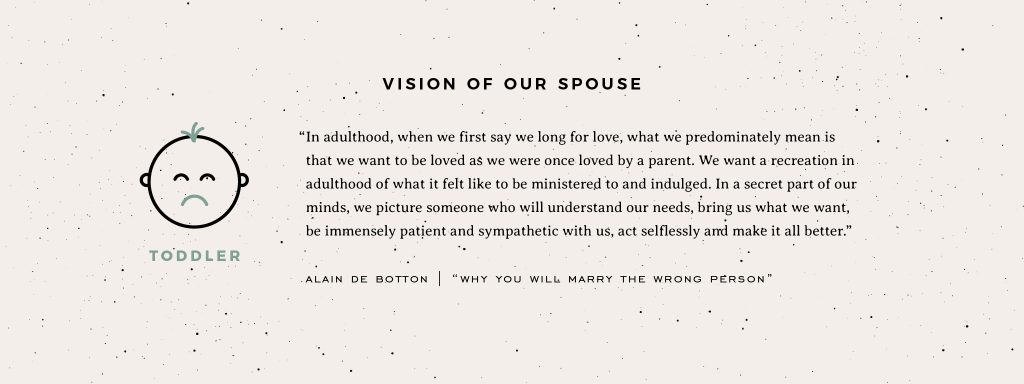
Toddler love is based on what the person can do for us: How does this person make me feel. What does this person do for
This vision is based on a high value of self-satisfaction and generally exhibits a low tolerance for pain.

Viewing your spouse as a treasure is a love that is based on the belief that this person is

So how do we cultivate this kind of heart and love for our spouses and our loved ones?
We pray.
“I urge you, first of all, to pray for all people. Ask God to help them; intercede on their behalf and give thanks for them.”
— 1 Timothy 2:1 NLT
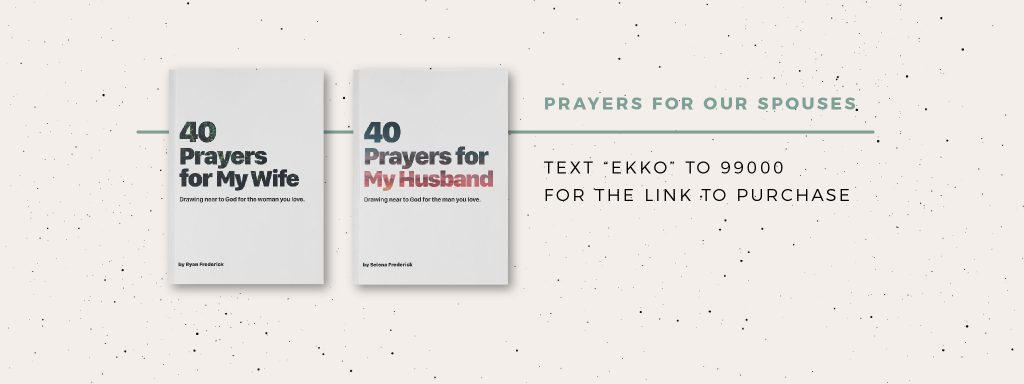
We can pray for our spouses because Christ is our inspiration and our example.
Because He first showed us how this selfless and self-sacrificing love looks on the cross: He inspires us to submit our selves to the other, to give of ourselves and make sacrifices. To cheer and celebrate our growth, to help us accomplish our mission, to love us to the point of death. To care for us, to leave Heaven for our sake. To amplify God in our union with Him and to treat us with the utmost respect.
“We love, because He first loved us.”
Pray this with us this week:
When I am blinded by the field,
Give me eyes to see the treasure.
In those of whom I love,
Because You first taught me how.
So I’ll find You in their faces,
I’ll look for You in the field.
Because You are the treasure I seek.
And You are the treasure in me.
You can listen to the sermon Leave and Cleave from the Ephesians series that inspired this post here.
All images and materials are copyright protected and are the property of EKKO Church unless otherwise noted and credited to their maker. Please do not copy or distribute without permission.
Recommended Books:
Sermons:
“Marriage as Ikon” from the Genesis Series
“Matchmaker” from the Genesis Series
Leave and Cleave
The Work of Our Hands
Liturgy for Work
Pray these prayers to help center you in His presence as you work to worship God and serve others through your work.
For the Beginning of the Day:
“Establish for me the work of my hands.” – Psalm 90:17
For Midday:
“Love God with all your heart, soul, mind; and love your neighbor as yourself.” – Matthew 22: 37-40
For the End of the Day:
“Cheerful, No Matter What.
Prayerful, All the Time.
Thankful, For Everything.
Amen.”
– 1 Thessalonians 5:16-18 (MSG)
Work at its worst is like a necessary evil in this life. We need to work to pay the bills, and often we work with people who we might not necessarily get along with. Sometimes, we even view work as a barrier to our best life.
Often we leave the highs of Sundays and meet the reality of Monday mornings. We often question: What do our menial jobs have to do with being a Christian? How do I find meaning in my job? Do I have to work in the ministry or at a nonprofit to find fulfillment?
In Ephesians 6:5-8, Paul writes for us to work wholeheartedly at our jobs, but what if our jobs are unfulfilling and feel purposeless?
Some of us just want to get to the weekend so we can do what we want or get to the important stuff in life.

But when we work for the weekend we are left feeling unhappy and discontent during the work week – and ultimately in our lives.
Some of us find our status and worth in our work. We work for significance and security.
But when we work for status, we are left feeling
The problem is: We have a distorted view of work and it’s
purpose . Without God-given purpose to work, what Paul is saying to the slaves and to us just sounds cruel. How can we work wholeheartedly to something we find no meaning in?
What are we missing?
In Genesis, we read that God bless the first couple and charged them to: fill the earth and subdue it. Rule over the fish in the sea and the birds in the sky and over every living creature that moves on the ground… The Lord God took the man and put him in the Garden of Eden to work it and take care of it.” (Genesis 1:28; 2:15)
From the start, the world God created wasn’t a perfect, pristine, piece of nature. Eden was a world that needed to be tamed into something hospitable for life. It needed to be filled out. Creation needed to be named.
God made man and woman to rule and to continue what God started.
To be human is to fill the earth with culture, with civilization, with computers, technology, cuisine, art, science.
We were created in God’s image to work: to take the raw materials of the land and make it into something beautiful and useful and to take care of the earth, (which we’re currently not doing a good job at) meaning that work was always a part of our DNA and design. We were actually created to make things. Paul reiterates this in Ephesians: we were created in Christ Jesus for good works.
Good works are not just religious work or humanitarian work, but also the work we do in your field and industry.
The way God provides for, protects, and nourishes us, is through each other’s vocations.
If you’re an accountant, how do you glorify God?
By being the best accountant you can be so that your organization is being a good steward of their finances helping the mission of the organization.
If you’re an artist, you glorify God by being the best artist you can be —magnifying the beauty of God by being stewards of awe and wonder.
If you’re a stay at home parent, you glorify God by being the best parent you can be, because that too is God-given, dignified, important work.
If you’re a manager or boss, you glorify God by treating your employees with dignity and giving them a fair wage. Not ruling over them with fear, but with grace and kindness.
The way that we are the hands and feet of Christ to our world is when we do our jobs with love and when we do our jobs well. Work is a part of how we love our neighbors. Our work is our ministry and all that ministry means is service unto the Lord.
How we serve others in our work is an indication for our love and worship for God.

Here’s the plan:
Advance Your Field: In order to work wholeheartedly, we do so by advancing our field. We should be fully engaged and focused at work to do the best possible job we can because the work we do is the same as serving God. (Ephesians 6:5-6)
When you are focused on the mission and good work of your company, you will also be able to celebrate the advancement of your coworkers, not compete or envy them. You’ll even be able to celebrate your boss. Because the goal is not self-advancement but the advancement of the work itself. We’ll be less concerned about our position and more concerned about its quality.
Adjust Your Attitude: The attitude we should have when we come to work each day is the same attitude we come to church. Where we come with the intention to glorify God and to serve others.
“Serve wholeheartedly, as if you were serving the Lord, not people, because you know that the Lord will reward each one for whatever good they do, whether they are slave or free.”
Everything you do unto the Lord is going to count towards eternity.
Abide with Christ: When we go to work, the Body of Christ is scattered, but we still carry within us the presence of God. We should anticipate Jesus the same way we do when we come to church.
You can listen to the sermon The Work of Our Hands from the Ephesians series that inspired this post here.
All images and materials are copyright protected and are the property of EKKO Church unless otherwise noted and credited to their maker. Please do not copy or distribute without permission.
Recommended Books:
Garden City: Work, Rest and the Art of Being Human
Every Good Endeavor: Connecting Your Work to God’s Work
Sermons:
Heigh-Ho, Heigh-Ho, It’s Off to Work We Go! (Numbers Series)
Behind the Mask (Numbers Series)
In the Kiln with Christ (Genesis Series)
Good Work, Fruitful Worship, True Wealth (Prayers for the Pilgrimage)
The Work of Our Hands (Sung Kim)
Ekklesia Study // February
This month, we’ll be going over the sermon “Anger and the Mess Along the Way” from the Ephesians Series. The sermon discusses how anger is a response to some kind of pain. Anger is not the problem. The problem is the problem. The goal for Friday is to get behind the anger and to healthily deal with anger when we feel it arising so that we do not sin.
For a more thorough summary of the sermon, click here.
“In your anger, do not sin…”
(I) What is a recent incident where you felt really angry?
(T1) Why did you feel angry in this situation and what was your response to it? Circle any of the following you were feeling: denied, dismissed, disadvantaged, delayed, disrespected, damaged, danger.
(T2) Why do you think you think you felt this way? What pain was behind your anger?
Ways we respond poorly to anger:
I repressed and suppressed my anger (Avoiding Pain).
I dumped anger on a loved one (Sharing Pain).
I created a monster out of someone (Killing Pain).
I nagged the heck out of someone (Controlling Pain).
(T3) Which of the below do you feel like you’re good at? Which do you struggle with?
Taking ownership of my feelings rather than being controlled by them.
Giving anger an outlet instead of repressing and suppressing it.
Facing the problem head on rather than dumping it on someone.
Imagining someone at their best instead of creating a monster out of them.
Letting go of control by forgiving them instead of nagging them.
Pray.
Bring your anger before God and invite the Holy Spirit. Once you have laid this before the Lord, take a pillow and shout into it. Yell whatever you want to say and cuss at it. This provides a cathartic expression to purge whatever is in your heart. A sense of compassion generally replaces the anger, allowing you to pray for that person. It also prevents you from slandering and dumping it on innocent bystanders.
Share and Reflect
In groups of 2-4, share what this experience was like for you. Close the time praying for one another.
Burdens and Loads // February
Have you ever sat down with one of your members and thought to yourself, how much do I get involved in this situation? What does help look like on my part in this case? What is my role in all of this?
Galatians 6 helps us discern this:
“Carry each other’s burdens, and in this way you will fulfill the law of Christ… Each one should test their own actions. Then they can take pride in themselves alone, without comparing themselves to someone else, for each one should carry their own load.”
Paul teaches us that there are burdens carry together in community and loads we have to carry on our own.
Burdens

Burdens are things we shouldn’t carry alone and things we don’t have the strength or resources to lift by ourselves. If we try doing it alone, it’ll crush us. These are crises like a chronically ill family member, temptations to sin we can’t seem to overcome, or bad situations we don’t have much control over. These are burdens we carry with community and prayer. They have to do with things that arise out of a general fallenness of humanity.
Loads
Loads are kind of like burdens, but they are things that other people shouldn’t carry for us. These are things we personally should take ownership for. These include daily responsibilities we have as a husband, wife, father, mother, and employee, etc. They also include our emotions, our attitude, and our actions as well as the consequences we must face after a bad decision.
Our goal as Ekklesia Leaders is to help people take ownership over their loads as a maturing Christian adult and to walk alongside them in their burdens.
But sometimes as a leader, the lines feel blurred. How do we discern this?
Listen Generously
“Listening is an everyday art and virtue, but it’s an art we have lost and must learn anew. Listening is more than being quiet while others have their say. It is about presence as much as receiving; it is about connection more than observing. Real listening is powered by curiosity. It involves vulnerability — a willingness to be surprised, to let go of assumptions and take in ambiguity. It is never in “gotcha”mode. The generous listener wants to understand the humanity behind the words of the other, and patiently summons one’s own best self and one’s own most generous words and questions.” – OnBeing, Grounding Virtues
Listening to others generously helps to ground you in love and compassion. It is giving the other the benefit of the doubt and posturing ourselves in a manner of a servant and friend.
Set Boundaries.
Here are some questions to consider:
If I get involved and help, will it actually help in the long run or will helping actually hurt them?
Am I helping so that this person can avoid a consequence of their bad decision? Will my involvement further perpetuate and reinforce bad decisions?
Put the ball in their court.
Ask questions that encourage personal responsibility for someone’s actions, emotions, and attitude. In his book, Question Behind the Question, John Miller gives us a framework for asking questions that steer clear from a victim mentality:
Begin with “what” or “how” questions. Not why, when, or who questions.
“Who dropped the ball?”
“When will others pull their own weight?”
Why, when, and who questions lends itself to blame. What and how questions lends itself to personal accountability:
“What can I do to improve this situation?”
“How can I change my attitude?”
When someone goes towards blame, shift the conversation so that they can focus on their load.
“What could you have done?”
“How can you carry this load?”
Help people focus on action that is concrete, not abstract.
Further Resources:
